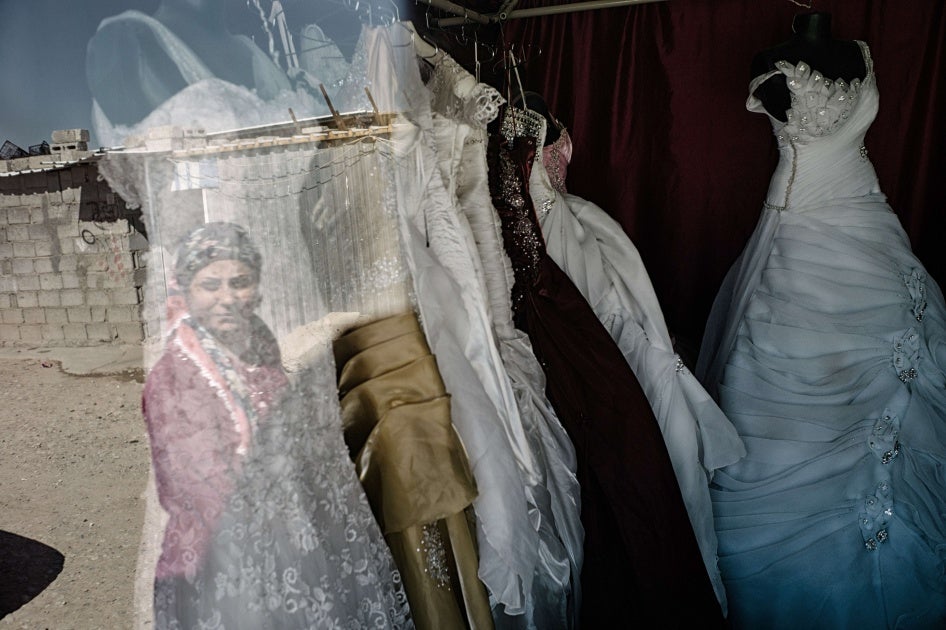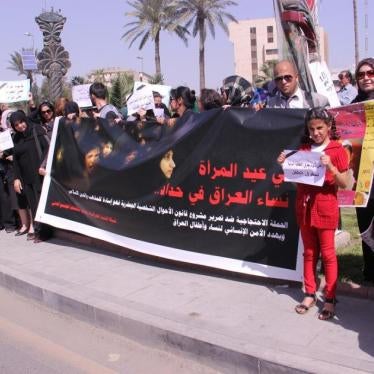- Religious leaders in Iraq conduct thousands of marriages each year, including child marriages, that flout Iraqi laws and are not officially registered.
- These marriages create a loophole around legal restrictions on child marriage and have disastrous effects on women and girls’ ability to get government services, register their children’s birth, and claim their rights.
- Iraq should prosecute religious leaders who officiate at marriages in violation of Iraqi law, facilitate the legalization of unregistered marriages, and ensure that all Iraqis have the full range of their rights.
(Beirut) – Religious leaders in Iraq conduct thousands of marriages each year, including child marriages, that flout Iraqi laws and are not officially registered, Human Rights Watch said in a report released today. These marriages violate women and girls’ rights and may leave them in precarious positions without social or financial support.
The 40-page report, “‘My Marriage was Mistake after Mistake’: The Impact of Unregistered Marriages on Women’s and Children’s Rights in Iraq,” documents the impacts of unregistered marriages on women and girls who enter them, and the downstream effects on their children. The unregistered marriages function as a loophole around legal restrictions on child marriage and have disastrous effects on women and girls’ ability to get government services and social services linked to their civil status, obtain birth certificates for their children, or claim their rights to dowry, spousal maintenance, and inheritance.
“Iraqi authorities need to recognize that unregistered marriages are opening the door to child marriage on a large scale,” said Sarah Sanbar, Iraq researcher at Human Rights Watch. “Iraqi authorities should take steps to halt the practice and not make women’s and children’s access to critical services like identity documents or health care dependent on their civil status.”
Human Rights Watch interviewed eight women and two men, all of whom married outside the courts, one child whose parents had married outside the courts, four local nongovernmental groups, and two international groups. Human Rights Watch also interviewed a judge at Al Bayaa court in Baghdad, and a judge at the Supreme Judicial Council.
Over the last 20 years, child marriage rates have steadily been increasing in Iraq. According to the United Nations Children’s Fund (UNICEF), 28 percent of girls in Iraq are married before age 18. According to the UN Assistance Mission in Iraq, 22 percent of unregistered marriages involved girls under age 14. Child marriage puts girls at increased risk of sexual and physical violence, adverse physical and mental health consequences, and being denied access to education and employment.
Although many communities in Iraq consider the religious marriages culturally legitimate, they are illegal under Iraq’s Personal Status Law and are not officially recognized until registered with the Personal Status Court, after which the couple is issued a civil marriage certificate.
Without a civil marriage certificate, women and girls are unable to give birth in government hospitals and are forced to opt for at-home births with limited access to emergency obstetric services. This increases the risk of medical complications that can threaten the life of both the mother and her baby, particularly when the mother herself is a child.
One woman interviewed, from southeast Baghdad, was married at 14 and was divorced by age 15. “My husband refused to ratify the marriage or divorce contract so legally [on my ID] I am still single,” she said. “I can’t claim the monthly [governmental financial support] of 105,000 IQD (about US$80) for divorced women since I have no proof of my marriage or divorce.”
Under Iraq’s Birth and Death Registration Law of 1971, parents can only obtain birth certificates for babies born in wedlock. A child without a birth certificate cannot secure any other identity document and is at risk of losing their legal identity or becoming stateless. If their status is left unresolved, these children may be barred from enrolling in schools, getting jobs, obtaining travel documents, owning property, or getting married.
“I was married when I was 14, and soon after I became pregnant, my husband abandoned our family and took my ID and our [religious] marriage contract with him,” one woman interviewed said. “I was so young, and I had to give birth in my mother’s house with a midwife because I couldn’t go to the hospital. I couldn’t get my daughter her documents, and now she is 16 and still has no documents.”
Her daughter said, “Not having documents really affects my mental health. I can’t go anywhere, and I never feel safe.”
When asked how her life would change if she were able to get her documents, she said, “It would allow me to go to school and experience a sense of citizenship within my nation. Compared to others, my aspirations might seem modest. I want to get an ID, go to school, earn a degree, and eventually get a job.”
The process to legalize an unregistered marriage is lengthy, complicated, and bureaucratic. The process becomes significantly more difficult in cases involving divorce or the death, disappearance, or denial of the marriage by one spouse. For many women, the social, financial, and emotional burdens associated with undergoing this process seem insurmountable, leading them to forego legalization, and thus, their rights.
When a couple in which one or both spouses are underage goes before the court to have their marriage legalized, the judge faces a fait accompli, Human Rights Watch said. If the judge refuses to legalize their marriage, it leaves the couple and their children in a precarious position. But when judges ratify religious marriage contracts involving children, it weakens the rule of law and facilitates the growing prevalence of child marriage in Iraq. Most judges opt to legalize child marriages.
In a case in which a Human Rights Watch researcher was in the courtroom, at Al Bayaa court in Baghdad in May 2023, a 17-year-old girl, visibly pregnant, entered with her father and her 20-year-old husband. They had married a year earlier and were seeking to legalize their marriage ahead of the birth of their child. Without deeper inquiry into the circumstances of the marriage and wishes of the underage bride, the judge asked her, her father, and her husband whether they consented to the marriage and then certified it.
There are no provisions in Iraqi law that explicitly punish religious leaders who officiate marriages that go unregistered, including in cases in which one spouse is a child. This enables religious leaders to sidestep Iraqi law with impunity, Human Rights Watch said.
A judge at the Supreme Judicial Council said that it may be possible to initiate prosecutions against religious leaders by using article 240 of the Iraqi penal code, which punishes any person “who contravenes an order issued by a public official or agent, municipal council or official or semiofficial body in accordance with their legal authority or who disobeys an order issued by those entities.” However, he said this provision has never been used.
“The impacts of not having a civil marriage contract can be devastating for women and girls, and their children,” Sanbar said. “Iraq should prosecute religious leaders who officiate marriages in violation of Iraqi law, facilitate the legalization of unregistered marriages, and ensure that all Iraqis are able to enjoy their full range of rights.”










